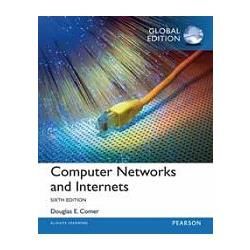Leading networking authority Douglas Comer presents a wide-ranging, self-contained tour of the concepts, principles, and technologies that enable today’s Internet to support applications ranging from web browsing to telephony and multimedia. Comer begins by illuminating the applications and facilities offered by today’s Internet. Next, he systematically introduces the underlying network technologies and protocols that make them possible. With these concepts and technologies established, he introduces several of the most important contemporary issues faced by network implementers and managers, including quality of service, Internet telephony, multimedia, network security, and network management. Comer has carefully designed this book to support both top-down and bottom-up teaching approaches. Students need no background in operating systems, and no sophisticated math: Comer relies throughout on figures, drawings, examples, and analogies, not mathematical proofs.Appropriate for all introductory-to-intermediate courses in computer networking, the Internet, or Internet applications; students need no background in networking, operating systems, or advanced mathematics.
本書特色
1. Broad Coverage of Key Concepts and Principles, Presented in a Technology-independent Fashion- Drawing on more than 30 years’ experience at the leading edge of networking research and implementation, Comer focuses on imparting knowledge that students will need regardless of which technologies emerge or become obsolete.- Every chapter includes hands-on exercises and projects that offer opportunities for students to test their knowledge and gain confidence in their abilities.
2. Flexible Organization that Supports both Top-down and Bottom-up Teaching Approaches- The text is organized into five parts. Chapters may be sequenced in multiple orders to accommodate a wide variety of instructor/student/course needs and preferences.- This text combines the best of top-down and bottom-up approaches. When presented in order, the book exposes students to applications and allows them to write network programs early, while delivering all material in logical order so a reader understands how each new technology builds on lower layer technologies.
3. An Accessible Presentation that Resonates with Students- No sophisticated mathematics is required—instead of formal mathematical proofs, Comer presents highly accessible examples, figures, drawings, and analogies.- The text answers the basic question: how do computer networks and Internets operate? It provides a comprehensive, self-contained tour through all of networking that describes applications, Internet protocols, network technologies, such as LANs and WANs, and low-level details, such as data transmission and wiring. It shows how protocols use the underlying hardware and how applications use the protocol stack to provide functionality for users.
4. Keep Your Course Current- In response to suggestions from readers and recent changes in networking, the new edition has been completely revised and updated. The significant changes include:
5. NEW! Updates throughout each chapter
6. NEW! Additional figures to enhance explanations
7. NEW! Integration of IPv4 and IPv6 in all chapters
8. NEW! Improved coverage of MPLS and tunneling
9. NEW! New chapter on Software Defined Networking and OpenFlow
10. NEW! New chapter on the Internet of Things and Zigbee
| FindBook |
有 3 項符合
COMPUTER NETWORKS AND INTERNETS 6/E (GE)的圖書 |
 |
COMPUTER NETWORKS AND INTERNETS 6/E (GE)【金石堂、博客來熱銷】 作者:COMER 出版社:全華圖書股份有限公司 出版日期:2015-01-01 語言:英文 規格:672頁/19*26cm |
| 圖書館借閱 |
| 國家圖書館 | 全國圖書書目資訊網 | 國立公共資訊圖書館 | 電子書服務平台 | MetaCat 跨館整合查詢 |
| 臺北市立圖書館 | 新北市立圖書館 | 基隆市公共圖書館 | 桃園市立圖書館 | 新竹縣公共圖書館 |
| 苗栗縣立圖書館 | 臺中市立圖書館 | 彰化縣公共圖書館 | 南投縣文化局 | 雲林縣公共圖書館 |
| 嘉義縣圖書館 | 臺南市立圖書館 | 高雄市立圖書館 | 屏東縣公共圖書館 | 宜蘭縣公共圖書館 |
| 花蓮縣文化局 | 臺東縣文化處 |
|
|
圖書介紹 - 資料來源:博客來 評分:
圖書名稱:COMPUTER NETWORKS AND INTERNETS 6/E (GE)
內容簡介
目錄
Preface xxiii
PART I Introduction And Internet Applications
Chapter 1 Introduction And Overview 1
Chapter 2 Internet Trends 17
Chapter 3 Internet Applications And Network Programming 27
Chapter 4 Traditional Internet Applications 49
PART II Data Communication Basics
Chapter 5 Overview Of Data Communications 85
Chapter 6 Information Sources And Signals 93
Chapter 7 Transmission Media 113
Chapter 8 Reliability And Channel Coding 135
Chapter 9 Transmission Modes 153
Chapter 10 Modulation And Modems 165
Chapter 11 Multiplexing And Demultiplexing (Channelization) 181
Chapter 12 Access And Interconnection Technologies 199
PART III Packet Switching And Network Technologies
Chapter 13 Local Area Networks: Packets, Frames, And Topologies 219
Chapter 14 The IEEE MAC Sublayer 239
Chapter 15 Wired LAN Technology (Ethernet And 802.3) 253
Chapter 16 Wireless Networking Technologies 265
Chapter 17 Repeaters, Bridges, And Switches 291
Chapter 18 WAN Technologies And Dynamic Routing 305
Chapter 19 Networking Technologies Past And Present 325
PART IV Internetworking
Chapter 20 Internetworking: Concepts, Architecture, And Protocols 335
Chapter 21 IP: Internet Addressing 345
Chapter 22 Datagram Forwarding 369
Chapter 23 Support Protocols And Technologies 391
Chapter 24 UDP: Datagram Transport Service 415
Chapter 25 TCP: Reliable Transport Service 425
Chapter 26 Internet Routing And Routing Protocols 447
PART V Other Networking Concepts & Technologies
Chapter 27 Network Performance (QoS And DiffServ) 469
Chapter 28 Multimedia And IP Telephony (VoIP) 489
Chapter 29 Network Security 507
Chapter 30 Network Management (SNMP) 533
Chapter 31 Software Defined Networking (SDN) 545
Chapter 32 The Internet Of Things 567
Chapter 33 Trends In Networking Technologies And Uses 579
Appendix 1 A Simplified Application Programming Interface 589
Index 617
PART I Introduction And Internet Applications
Chapter 1 Introduction And Overview 1
Chapter 2 Internet Trends 17
Chapter 3 Internet Applications And Network Programming 27
Chapter 4 Traditional Internet Applications 49
PART II Data Communication Basics
Chapter 5 Overview Of Data Communications 85
Chapter 6 Information Sources And Signals 93
Chapter 7 Transmission Media 113
Chapter 8 Reliability And Channel Coding 135
Chapter 9 Transmission Modes 153
Chapter 10 Modulation And Modems 165
Chapter 11 Multiplexing And Demultiplexing (Channelization) 181
Chapter 12 Access And Interconnection Technologies 199
PART III Packet Switching And Network Technologies
Chapter 13 Local Area Networks: Packets, Frames, And Topologies 219
Chapter 14 The IEEE MAC Sublayer 239
Chapter 15 Wired LAN Technology (Ethernet And 802.3) 253
Chapter 16 Wireless Networking Technologies 265
Chapter 17 Repeaters, Bridges, And Switches 291
Chapter 18 WAN Technologies And Dynamic Routing 305
Chapter 19 Networking Technologies Past And Present 325
PART IV Internetworking
Chapter 20 Internetworking: Concepts, Architecture, And Protocols 335
Chapter 21 IP: Internet Addressing 345
Chapter 22 Datagram Forwarding 369
Chapter 23 Support Protocols And Technologies 391
Chapter 24 UDP: Datagram Transport Service 415
Chapter 25 TCP: Reliable Transport Service 425
Chapter 26 Internet Routing And Routing Protocols 447
PART V Other Networking Concepts & Technologies
Chapter 27 Network Performance (QoS And DiffServ) 469
Chapter 28 Multimedia And IP Telephony (VoIP) 489
Chapter 29 Network Security 507
Chapter 30 Network Management (SNMP) 533
Chapter 31 Software Defined Networking (SDN) 545
Chapter 32 The Internet Of Things 567
Chapter 33 Trends In Networking Technologies And Uses 579
Appendix 1 A Simplified Application Programming Interface 589
Index 617
|











